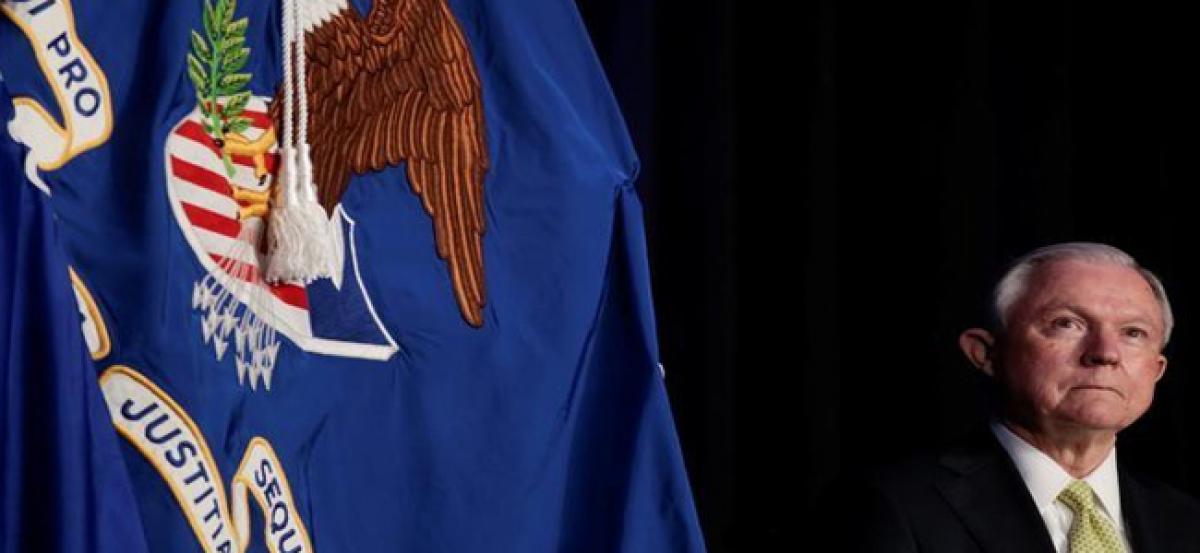Live
- UN warns armed violence deepens humanitarian crisis in Sudan
- Maha Vikas Aghadi will win over 160 seats, form government in Maharashtra, says Shivakumar
- 6 Factors to Consider While Choosing the Right IVF Clinic in Hyderabad
- PM Modi emplanes for three-nation visit to Nigeria, Brazil, Guyana
- Chandrababu stresses on deregulation in telecom sector at Hindustan Times conference
- MP govt to promote 'Gita Jayanti' like other festivals
- Sidhant Gupta Revolutionises India’s Dairy Sector with Cutting-Edge Technology
- National Press Day 2024: Honouring Journalism in the Digital Era
- Margashirsha 2024: Dates, Rituals, and Spiritual Significance
- Celebrating International Day for Tolerance 2024: Fostering Global Respect and Understanding
Just In

U.S. Attorney General Jeff Sessions will face questions on Tuesday about his dealings with Russian officials and whether he intentionally misled Congress
WASHINGTON: U.S. Attorney General Jeff Sessions will face questions on Tuesday about his dealings with Russian officials and whether he intentionally misled Congress as a Senate panel investigates alleged Russian meddling in the 2016 U.S. presidential election.
Sessions' testimony before the Senate Intelligence Committee, scheduled to start at 2:30 p.m. (1830 GMT), keeps the political spotlight on the Russia issue, sidelining President Donald Trump's domestic agenda.
The former Republican U.S. senator, an early supporter of Trump's presidential campaign, will likely have to explain why he told lawmakers in January that he had no dealings with Russian officials last year.
His staffers have since acknowledged that he met twice with Russian Ambassador Sergei Kislyak. They say he did not mislead Congress because the encounters were part of his job as a senator, not as a surrogate of the Trump campaign.
But the revelations forced Sessions to recuse himself from the Russia investigation in March.
Sessions is likely to be asked whether he played a role in Trump's decision to fire FBI Director James Comey last month - a move that caused Trump's critics to charge that the president was trying to interfere with a criminal investigation.
The attorney general will also face questions about whether he met Kislyak on a third occasion. Several media outlets have reported that Comey told the Intelligence Committee in closed session last week that the FBI was examining whether Sessions met with Kislyak at a Washington hotel last year. The Justice Department has denied such a meeting occurred.
It is not clear whether Sessions plans to answer all the questions or if he will invoke executive privilege to avoid disclosing private conversations with the president.
Some members of the Intelligence Committee, frustrated by the tight-lipped performance of other administration officials at an open hearing last week, said they were not going to allow Sessions to follow suit.
"That's just not going to be acceptable," said Senator Ron Wyden, a Democrat on the committee.
One of those administration officials, Admiral Michael Rogers, head of the National Security Agency, met again with members of the Intelligence Committee in a closed-door session on Monday evening, according to the agency.
Amid the political firestorm that followed Comey's dismissal, the Justice Department last month appointed a special counsel to oversee the probe into Russian election interference and any collusion by Trump aides.
Trump has been publicly dismissive of the Russia investigation for months. A Trump confidant, Chris Ruddy, told "PBS NewsHour" on Monday the president was weighing whether to fire the special counsel, former FBI Director Robert Mueller. Such a move would be bound to unleash a storm of fresh charges that Trump is seeking to hinder the Russia investigation.
Newt Gingrich, a former Republican House of Representatives Speaker and Trump ally who initially praised the choice of Mueller, complained this week that Mueller had hired too many Democrats. Gingrich told CBS "This Morning" that Trump called him on Monday night to discuss Mueller but he did not think the president was considering firing him.
The Intelligence Committee is one of several congressional panels looking into the Russia issue, alongside Mueller's probe. Russia has denied interfering in the U.S. election. The White House has denied any collusion with Moscow.

© 2024 Hyderabad Media House Limited/The Hans India. All rights reserved. Powered by hocalwire.com







